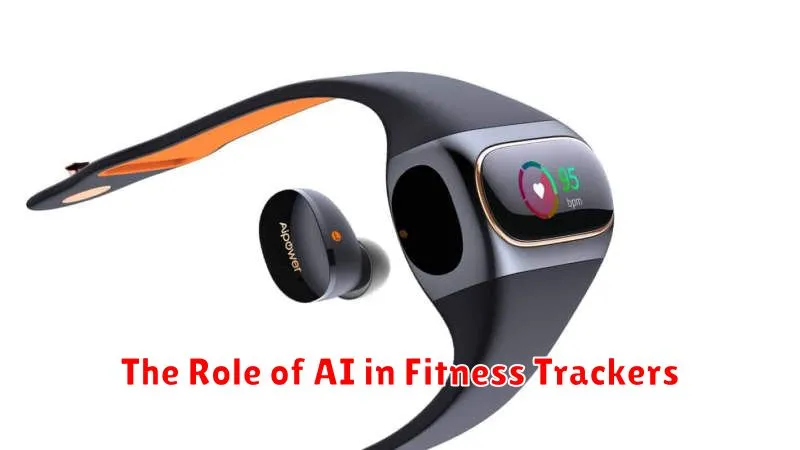The world of fashion and fitness is undergoing a revolutionary transformation with the advent of Artificial Intelligence (AI) in smart wearables. These sophisticated devices, equipped with cutting-edge AI capabilities, are not only enhancing our style but also revolutionizing how we approach our well-being. From personalized fitness recommendations to adaptive clothing that responds to our environment, AI-powered wearables are redefining the way we interact with technology and our bodies.
The integration of AI into smart wearables has unlocked a plethora of possibilities, empowering individuals to take control of their health and fashion choices. With AI algorithms analyzing vast amounts of data, wearables can provide highly personalized insights, helping us make informed decisions about our fitness routines, dietary habits, and even our wardrobe choices. This article will delve into the exciting world of AI-powered smart wearables, exploring how this technology is changing the landscape of fashion and fitness.
The Role of AI in Fitness Trackers

Fitness trackers have become increasingly popular in recent years, thanks in part to the integration of artificial intelligence (AI). AI is transforming the way we track our fitness, providing more personalized and effective insights than ever before.
One of the key ways AI is changing fitness trackers is through personalized recommendations. By analyzing data from your workouts, sleep patterns, and other activities, AI algorithms can recommend tailored exercises, workout routines, and recovery strategies. This helps you stay motivated and achieve your fitness goals more effectively.
AI also plays a crucial role in activity tracking and analysis. Beyond simply tracking steps and calories burned, AI-powered fitness trackers can now recognize different types of exercise, measure intensity levels, and even provide real-time feedback. This allows you to get a deeper understanding of your workouts and make adjustments as needed.
Furthermore, AI is being used to develop advanced features such as fall detection, heart rate monitoring, and sleep quality analysis. These features can provide valuable insights into your health and well-being, potentially alerting you to potential problems or helping you make informed decisions about your lifestyle.
In conclusion, AI is revolutionizing the fitness tracker industry, offering a more personalized, effective, and insightful experience. As AI technology continues to evolve, we can expect even more innovative features and functionalities that will further enhance our fitness journeys.
How AI is Enhancing Wearable Fashion
Artificial intelligence (AI) is revolutionizing the fashion industry, transforming how we design, manufacture, and consume clothing. AI-powered wearables are not only enhancing our fitness journeys but also enhancing the way we express ourselves through fashion.
One of the most significant impacts of AI on wearable fashion is in personalized style recommendations. AI algorithms can analyze your shopping history, social media activity, and even your body measurements to suggest clothing styles, colors, and brands that align with your individual taste. This personalized approach not only saves time and effort but also ensures you discover fashion pieces that truly resonate with your style.
Beyond personalized style, AI is also empowering customized clothing. Wearable technology allows for the creation of clothing that adapts to your body and environment. Imagine jackets that automatically adjust to the temperature, shoes that adjust to your gait, or even clothing that changes color based on your mood. This level of personalization is only possible thanks to the power of AI.
Moreover, AI is changing how we interact with our clothes. Smart fabrics can monitor your health metrics, track your fitness progress, and even respond to your commands. This opens up a world of possibilities for interactive and functional fashion, where clothing is no longer just a means of covering our bodies but a tool for enhancing our lives.
The fusion of AI and wearable fashion is pushing the boundaries of what’s possible in the industry. It’s allowing for greater personalization, enhanced functionality, and a more conscious and sustainable approach to fashion. As AI continues to evolve, we can expect even more exciting innovations that will redefine our relationship with clothing and fashion.
The Benefits of AI in Smart Watches
Smartwatches, powered by AI, are transforming the way we live, work, and play. From health tracking to personalized recommendations, AI is enhancing our experience and making our lives more convenient.
One of the most significant benefits of AI in smartwatches is enhanced health monitoring. AI-powered algorithms can analyze your heart rate, sleep patterns, and activity levels to provide personalized insights and identify potential health risks. This data can help you make informed decisions about your health and well-being.
Another key benefit is personalized fitness tracking. AI algorithms can learn your workout routines and provide real-time feedback, adjusting the intensity and duration of your workouts based on your progress and fitness goals. This personalized approach ensures that you’re getting the most out of your workouts and maximizing your results.
Moreover, AI-powered smartwatches can provide seamless integration with other smart devices. This connectivity allows for a more holistic and automated approach to managing your daily tasks and activities, making your life easier and more efficient.
In conclusion, AI in smartwatches is revolutionizing the way we interact with technology, offering a wide range of benefits from personalized health monitoring to intelligent fitness tracking. As AI continues to evolve, we can expect even more innovative features and functionalities in smartwatches, making them even more indispensable in our daily lives.
Challenges in Implementing AI in Wearables
While the potential of AI in wearables is exciting, implementing it effectively presents a number of challenges.
One major hurdle is data privacy. Wearables collect sensitive personal data, including health information and location details. Ensuring the secure storage and ethical use of this data is crucial, as breaches can have serious consequences.
Another challenge is limited computing power. Wearables have limited processing power and battery life, making it difficult to run complex AI algorithms. This constraint necessitates efficient algorithms and careful optimization to ensure smooth performance.
The size and form factor of wearables also pose limitations. Designing AI systems that fit within the compact space and maintain user comfort is a demanding task.
Furthermore, user experience is paramount. AI systems must be intuitive and user-friendly, offering seamless integration with the wearable’s functionality. A complex or confusing AI experience can hinder adoption and user satisfaction.
Finally, data quality is crucial. AI algorithms rely on accurate and consistent data for effective performance. However, the data collected from wearables can be noisy and prone to errors, requiring robust data cleaning and preprocessing techniques.
The Future of AI-Driven Wearables

The future of AI-driven wearables is brimming with exciting possibilities. As technology continues to evolve, we can anticipate even more personalized and intuitive experiences.
Advanced health monitoring will be a key focus. Wearables will be able to track a wider range of health metrics with greater accuracy, providing personalized insights and early warning signs for potential health issues. This could revolutionize preventative healthcare and empower individuals to take control of their well-being.
Personalized fitness guidance will become more sophisticated. AI-powered wearables will adapt to individual fitness levels, goals, and preferences, delivering tailored workouts and nutrition plans. This will make fitness more accessible and effective for everyone.
Augmented reality (AR) and virtual reality (VR) integration will create immersive experiences. Wearables will enhance our perception of the world around us, providing information and entertainment in real-time. This could transform our interactions with our environment and enhance our understanding of the world.
Seamless connectivity will be a defining feature. Wearables will effortlessly communicate with other devices and systems, creating a truly integrated smart ecosystem. This will streamline our daily lives, making information and services readily available at our fingertips.
The future of AI-driven wearables holds immense potential. These innovative devices will not only transform the way we live but also empower us to achieve a healthier, more fulfilling, and connected lifestyle.
Case Studies: Successful AI-Driven Fashion Wearables
The world of fashion wearables is rapidly evolving, driven by advancements in artificial intelligence (AI). AI-powered wearables are not just about tracking steps and heart rate; they are revolutionizing the way we dress, shop, and even interact with our surroundings. Let’s explore some successful case studies highlighting how AI is transforming the fashion and fitness industry.
Nike Adapt BB, for example, is a basketball shoe that uses AI to personalize the fit. It features a motor-powered lacing system that adjusts automatically to the wearer’s foot, providing a custom and comfortable fit. This innovative feature allows athletes to focus on their performance without having to worry about their footwear.
Another notable example is Ralph Lauren’s PoloSense, a shirt that incorporates AI-powered sensors to monitor the wearer’s vital signs. This data is then used to provide personalized health insights and recommendations, promoting a healthier lifestyle. The shirt also uses AI to adjust its temperature based on the wearer’s activity level, ensuring optimal comfort throughout the day.
Beyond fitness and health, AI is making its mark in fashion design. Levi’s’s collaboration with Google created the “Jacquard” line of smart clothing. These garments incorporate AI-powered technology that allows users to control their smartphones, music, and other devices through gestures on their clothing. This seamless integration of technology with fashion opens up exciting possibilities for future smart clothing designs.
These case studies demonstrate the potential of AI in shaping the future of fashion wearables. As AI technology continues to advance, we can expect even more innovative and personalized experiences, pushing the boundaries of fashion and fitness.



